#one hell of a corruption arc
Explore tagged Tumblr posts
Text

Ooh almost forgot to post this before going to bed
He's done! And has gone through a very harrowing few experiences. Anyways it's Asa again, but this time fully colored! And you get another good look at how becoming al-Riyad changed him.
Here's both images on their own:


#artists on tumblr#art#oc art#digital art#my art#oc#ocs#my ocs#artwork#alien oc#oc lore#oc stuff#sci fi fantasy#original species#originalcharacter#alien species#one hell of a corruption arc#well you wouldn't be doing too well if you were bodied into a pit and died#and then came back#but wrong#and became a cult leader#Spotify#and then found out your brother just replaced the corrupt regime you fought to overthrow with his own one#the crashout was justified#bonus you gained crazy cool powers (that are slowly morally corrupting you)#golden boy what happened to you
4 notes
·
View notes
Text
they make me ILL and SICK IN THE HEAD
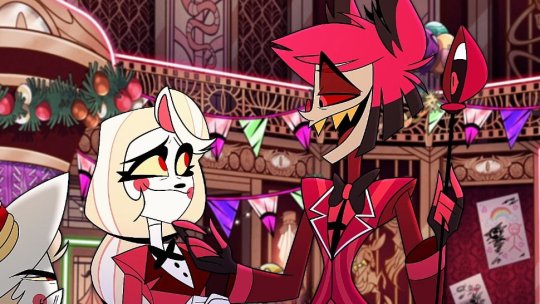
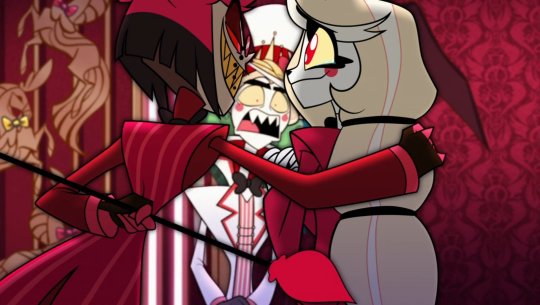
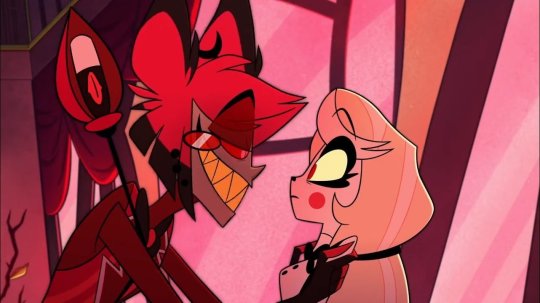
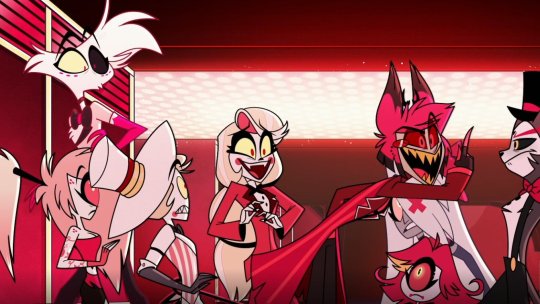
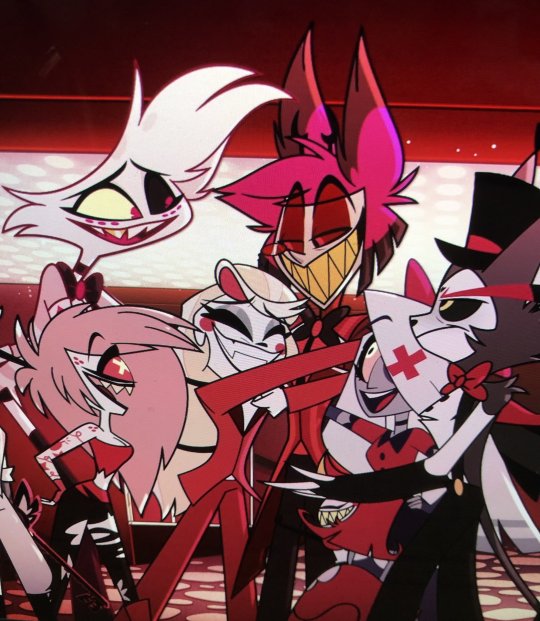

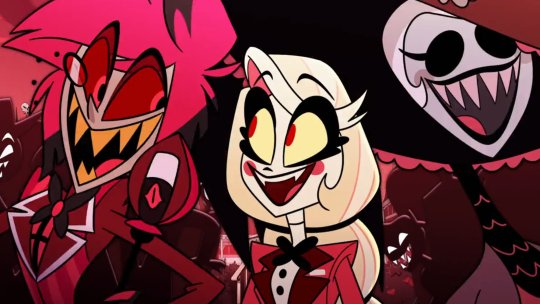
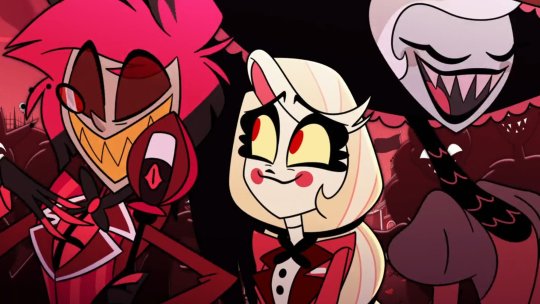
#they got that goaded into a terrible decision swag that corruption arc swag#that i'll help you unlock your full horrific glorious grotesque potential swag that i'll change you for the better/worst irrevocably swag#*shaking you by the shoulders* listen 2 me oh my god it's abt who's right abt hell and redemption#it's abt al being both mentor and ally and obstacle it's abt who truly is getting corrupted it's abt the power imbalance between#the overlord & the princess of hell it's abt how in trying to manipulate her she inadvertently becomes one of his soft spots#it's abt the inevitable heartache and betrayal when their respective deals blow up in their faces#it's abt falling hook line sinker into something you promised you were never going to do#and i will be honest. i love their voices and how touchy they are w each other. little things like that#the first shot ESPECIALLY#and ik he was fucking w lucifer. but she just looks SO unexpectedly fond#every time charlie brightens at him i get closer and closer to losing it#charlastor
128 notes
·
View notes
Text
there uuuuu gooooooooooooooo
#plot is movingggg next chapter is mjjw focused no one tell me ANYTHING PLEASE I WANTED THE CORRUPTION ARC TO HAPPEN FIRST. LEAVE ME ALONE#sfh#strangers from hell#seo moonjo#yoon jongwoo#seo moonjo/yoon jongwoo
8 notes
·
View notes
Text
Nope. Nope, not gonna be okay.
I've rambled about this before but yeah, if what I'm seeing is true, like legit, it's actually going to happen like that TRUE? Then I'm gonna be not a little bit upset.
#my ramblings#see i don't like to get attached to characters for two reasons#one reason is because blorbo i love turns out to be really bad despicable person on bad of a corruption arc#okay second reason is because blorbo i love ends up dying somehow (tragically or sacrificing themselves or whatthefuckever)#i mean okay they're fictional characters but fuck it I was beginning to like that character and they fucking deserve happiness#why the hell do they have to die and so fucking quickly....honestly
2 notes
·
View notes
Text
Rescue mission role reversal. I. Already have one???
This links to a wheel with nearly a hundred fic tropes for plots, settings, and more. Spin it twice.
This could also work with art inspiration, but the buttons only allow for so many characters on them. And please do ramble in the tags! I'm going to have no idea what most of you are talking about, and it's going to be great.
#roleswap rainbow quest au ofc#theres. a lot of different rescues#one that comes to mind is in act 2(?) where swap!Sabre#and swap!soul/corruption (time/el's roles)#venture to the pre-rainbow void arc and save o!rainbow from void#oh and swap!void ofc (hes rainbow in the au <3)#the 4 of them take turns slicin n dicin og void#before og rainbow wakes up and og sabre/elemental helps him take the final blow to void#its gory and fix-it as hell <3#delightful
19K notes
·
View notes
Text
I think about Azula shooters often and their common refrain of "if Azula hadn't had a mental breakdown, she would've won" and I'm here to tell you that no, she wouldn't have.
There is no universe in which Azula was winning that fight with Zuko (or Katara, for that matter).
Azula spent so much of Book 2 being built up as this deadly terrifying force against whom the heroes are badly outmatched that it can be difficult to catch exactly how quickly Zuko is advancing.
Back up a bit to Book One. For the fearsome exiled crown prince of the Fire Nation, Zuko's not that impressive a firebender. He's not bad by any stretch, and he's able to lay the untrained Sokka and Katara flat pretty easily. Then he gets in the ring with Aang, who is an airbending master, and the difference between a regular bender and a master becomes apparent when Aang literally puts his ass to bed:

People have attributed this to the fact that no one's fought an airbender in 100 years, but I think it's also worth noting that Aang (a 12 year old from a pacifist nation) has probably never fought anyone before. Like, ever. And yet the second Aang thinks "okay, I'll attack back", the fight's over.
Zuko's got the same genetic predisposition for firebending talent that Azula does, yet it never seems to manifest because of his mental blocks. At the beginning of the series, he's already so beat down that all he really has is conviction, pride, and anger, so even with training from Iroh (the firebending master, thank you very much), he struggles. Yet throughout Book 2, when he has no time to train because he's on the run, he actually seems to advance faster. The fact that his bending is literally tied to his character arc (as his morals become tangled and he has to fight off aforementioned mental blocks) is pretty brilliant. Like, by the time of the Crossroads of Destiny, Zuko getting his ass handed to him by Aang is a pretty consistent feature of the show--he just can't match wits with him.
Hell, at the beginning of the series, he and Iroh (again: the actual firebending master) launch a combined power surface-to-air attack...which Aang casually swats away into a nearby ice wall. Come the Crossroads of Destiny, however, and Zuko by himself launches this bigass fireball that blows through Aang's defenses.

Zuko advances so quickly that it's scary. That prodigious talent is in him even if it doesn't come through as cleanly as with Azula. Who, by the way, was busy about to get flattened by Katara some few dozen feet away, until Zuko took over and then effectively stalemated her himself.
All of this in retrospect makes it abundantly clear why Zuko's firebending seemed to skyrocket so much when he learned true firebending from the Sun Warriors: it was really the only thing left. He's hard a hard road learning how to fight waterbenders, earthbenders, and airbenders, and even if unconsciously, he's applying the philosophy Iroh taught him about augmenting his bending style with aspects of other styles (see also, the waterbending-like fire whips he uses in the above gif). Once he actually understands fire and how it works, he's got it mastered. Hence why any gap between him and Azula effectively disappears as soon as their next fight--before her friends have betrayed her and her stability goes out the window. There's no real sense of urgency to their fight at the Boiling Rock prison. True, Sokka's presence with the sword helps, but Zuko doesn't look remotely worried and he counters Azula's every attack perfectly.
All her life, Azula only ever learned fire. She was taught by the best people the fire nation can employ, so she knows all the cool tricks, but she's still poisoned by the corrupted firebending practiced in the modern ATLA timeline. Unlike Zuko, who managed to get the basics if nothing else from Iroh (fire comes from the breath, and can be used to survive as much as to kill), Azula has always used fire as a weapon and a means to hurt others. She has no true knowledge of the craft, meaning she's got the same weaknesses as Zhao, she's just better disciplined to the point she can make up for it.
Zuko's victory was a given considering Azula's complete loss of control by the time of Sozin's comet, but even had she been in a perfect mental state, she'd have lost, because in many ways Zuko is simply the better firebender.

And that's the truth of it.
5K notes
·
View notes
Text
Idk. The way I personally see it, the sUbvErSiOn in Rhaegar's storyline is NoT that a hot blonde twink who plays the harp is actually a Machiavellian rapist who single-handedly destroyed Westeros instead of saving it. The subversion isn't even that the prophecy that was supposed to save people actually killed them. The subversion, imo, is that Rhaegar, having the typical fantasy attributes of a hero (his idiosyncrasy and his gender), instead of saving Westeros as he was supposed to, died. He died.
He died. Without accomplishing anything.
He was the only one who knew and gave a fuck about the prophecy, the only one who had the bigger picture and wasn't so deep into the political game, the only one who was trying to figure out a possible solution. He was good, people loved him, he should have succeeded, he would have succeeded if this was a different story, a more predictable sorry. It should have been him.
And he got killed. And instead of that guy, who was decent and good and idealistic, the only one who was, the kingdom is left to Robert, Tywin and the twins. You are yapping day and night about Rhaegar only looking after his cock when in reality, Rhaegar was the only major male character in the rebellion's timeline, with the exception of Ned, that gave fuck about sth that wasn't his own cock. And he lies dead while Robert the actual rapist, Tywin, the actual murderer and the twins, the actual murderers/schemers, aka all your faves, are doing whatever the fuck they please with the power they very unjustly possess.
In some media, subversion is a question of morality, a plot twist, a "the tragic fallen hero is actually the villain" arc. I don't think that's the case with that character. The way I see it, subversion here is about narrative progression. We would normally expect a classic high fantasy hero like Rhaegar to succeed in his quest or at the very least to achieve his purpose after sacrificing himself in a blaze of glory. Not here. Here the hero both fails and falls, and we are struck by the ruthless realism of the game, intentions don't matter, ideals don't matter, everything is shot to hell because the other guy was simply better with the sword. And when we think it's all over and this world is literally doomed to be eaten alive by the corrupted traitors that govern it long before the long night comes, here comes Rhaegar's younger, exiled, uneducated, powerless, enslaved, forgotten sister and suddenly it's not over. It is her who brings the dragons back, it is her who is going to fulfill the prophecy along with his forgotten bastard son Jon (not gonna go into TPTWP debate let's assume it's both of them). That is the subversion. That's the full extent of it. I think that's a substantially richer take than treating him like fucking Griffith from Berserk or sth but whatever.
#asoiaf#rhaegar targaryen#daenerys targaryen#aspa rambles#I'm repeating myself but it's my blog so I can be as repetitive as I want who cares lol
250 notes
·
View notes
Note
Shana, your tags on this post ...I need to know more! What exactly was the plan for Supernatural season 3 if it hasn't been for the writer's strike??? And how haven't I heard about this already?? I need the deets!
i'm so glad you asked :)
the original plan for season 3 was for sam to descend into using his demon powers to get dean out of the deal, and for dean to never go to hell. then the writers strike happened, the season got cut from 22 eps to 16, with only 4 after the strike, and that wasn't enough time to establish sam's spiral and powers, so changed the ending. it's on the wiki and there are some articles around about it
this was, in my opinion, the worst fucking decision they could make
it ruined the characters in a lot of ways and really unbalanced everything in a way the show never recovered from
the thing is that this arc is so well set up!
literally at the end of season 2 we get
"You're my big brother, there's nothing I wouldn't do for you. And I don't care, I'm going to get you out of this. I'm going to save your ass for a change."
sam has evaded azazel's every attempt to corrupt him. his shitty home life, all the demons he's exposed sam to, killing jessica, taking away his father, putting him in a literal life or death hunger games scenario. each time sam refuses to play ball
(sam's incorruptibility is what makes him qualified to be king of hell, but that's a different post)
he's the moral compass between him and dean. always has been. there is nothing in sam's messed up, twisted life that has pushed him pass mercy
but dean could do it. there's nothing sam wouldn't do for his big brother
john told dean that he had to either save sam or kill him. except he's never needed to save sam, because it's literally always sam making the measured, compassionate, merciful call. he's the one holding dean back, not the other way around
and sam straining towards darkness for the first time, for dean, would kill him. we'll come back to this
mystery spot, as an episode, is actually pointless if the plan was for dean to go to hell. because sam's sneak peek into what his life is like after dean doesn't do anything. i love this ep, but it's narratively pointless now
however
with the og plan, mystery spot is the turning point. it not only tells sam how miserable he'll be after dean is gone, but it also establishes what he's willing to do to get him back - pretty much anything. it's not theoretical pain, it's not theoretical grief. mystery spot is the thing that pushes sam towards being hard, away from the moral sweetness he's embodied for the past two and half seasons.
the next ep, jus in bello, shows this. sam is considering doing the terrible thing. he's now capable of considering the terrible thing in a way he wasn't before mystery spot. this is when his descent starts, when sam decides he's willing to trade his humanity for his brother's life
and then the writer's strike happened
right when it's getting good, right when sam's arc is ramping up, we lose it. and instead of picking it back up, pushing dean's deal to next season and giving it the weight it deserves, they say fuck it, and send dean to hell
but this fucks it all up. we have sam's "descent" with ruby and demon blood. except not really because he's not even hurting anyone. and dean's back, but not because of sam. sam didn't save him
this fucks it all up
because deans anger and fear and desire to save sam should have been tempered with the knowledge that he did that to save dean's life. that once more someone dean loves has made a terrible sacrifice for him, which he can't stand, which he hates. he has the self esteem of a gnat and the best people he knows keep destroying themselves for his benefit
i think the og build up was sam strengthening his powers to kill lilith, doing it, and then releasing lucifer at the end of s3. sam unwittingly starting the apocolypse to save his brother (does he regret it, dean wonders. it would be easier if he did)
and now everything is shit and dean's drowning but here and his brother has turned himself into something that's not unlike the kid dean loves so much it almost killed him, but not exactly the same. and now he understands john, because this is the sam that dean has to either save or kill, except he could never kill him. he loves him (and how can he kill sam for doing this when it's dean's fault, when dean made the deal that doomed his brother when all he wanted was to save him)
this is the flip that the show has been building towards. dean having to be the moral center for his brother for once. dean being the one saved. dean finally having to face his father's words and deciding once and for all if he's john's son or sam's brother
but instead dean goes to hell. and he's no one moral's center. because he broke in hell, he tortured people and he enjoyed it. they ruined dean with this. because instead of fighting and growing from his violence, they push him into it, and then they call him a righteous man. dean was the one harming people, he's the one that descended into darkness, not sam. sam and his demon blood had still only been trying to good, and in the end did do good, far more than anything dean did in hell, or has done since. his moral outrage, his anger, his disgust towards sam isn't only wildly out of character, it's hypocritical as hell. sam remains the moral, compassionate one, even through this. it never slides to dean. neither of them are really forced to grow or change, only to become twisted into each other in ways that hurt them both
this should have been the story of what sam would do to save his brother (anything) and what dean would do to save his brother (anything)
they should have saved each other
#instead we get dean as an abusive asshole and sam the perpetual victim from him from lucifer from everyone#in magicians julia has a line after her sa about how shes not a delicate flower or a fragile piece of glass that she's a person and ppl hea#they never let my boy heal#either of them#something something everyone is sam's family making deals that he has to pay for#supernatural#asks#flamingwell
269 notes
·
View notes
Text
elephant in the room 🐘
rant about the state of online shifting; "get-it-off my chest" moment

part 1. scripting trauma/ being a bad person in a dr how many people are really doing "bad things" or scripting in trauma in their dr? lets be so fucking for real here. why is it that everytime someone "morally corrupt" it gets exposed months apart and the "culprit" is some small ass account with like ten followers? its not common. and im not saying it never happens. but shiftok is always on about these people and im like...who tf are yall talking about? they find one bad apple and then decide the whole community needs to be reminded how fucked up it is to do xyz.
i mean lets be realistic, how many people are going out of their way to script something traumatic or harmful? the majority of the online community (reddit, tumblr, tiktok) always talks about shifting for their s/o, adventure, frienships, family or a better life in some way. how many people are deliberately scripting to harm themselves or others? and is the number really so much that we need thinkpiece after thinkpiece about it?
aand when others behave immorally or get traumatized in their dr they will experience it. they will see the effects of any bad things they do to others. they will feel the trauma first hand and suffer from what theyve scripted in many ways. we dont need to punish these people. their dr will do it for them.
P. S what about when you shift to a dr like the walking dead? or even mha and keep in the war arc? thats traumatic. hell, even an idol / fame dr can be traumatic and those are hella common! yet nobody bats an eye or reprimands it...odd...

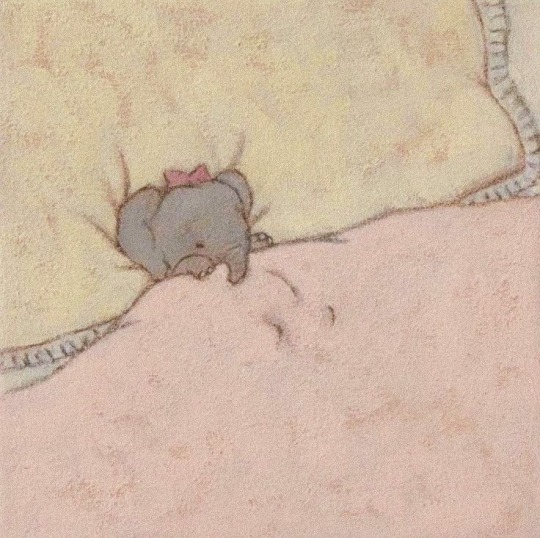
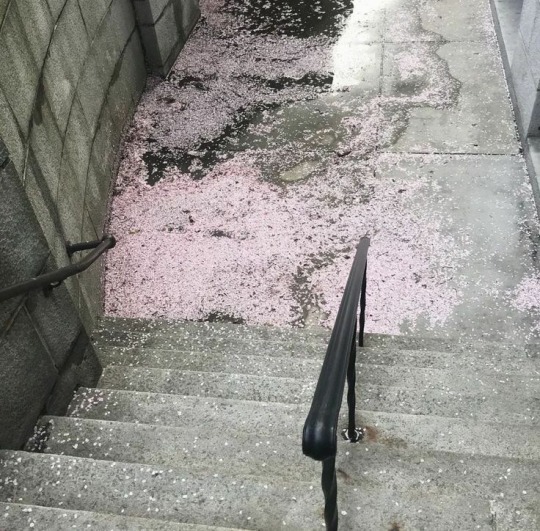
part 2. racebending race doesnt exist. i saw a shiftoker (a white one too??) act like someone was crazy for saying it! the whole concept was created by europeans! white mans burden, race based social classes, and eugenics all seems natural to yall? i mean logically its not odd to anyone that modern racial concepts were made by the same group of people in the same time period...? the time period people needed excuses to kill, rape, steal from and enslave other groups... search up "who created race" and then report back to me..anyways..
name one good thing that splitting people up and assigning them identities based on their background does for us? its caused mocking of those that dont fit the mold their race gives them, harmful views of other because of their racial group(s) and low self esteem from outside perceptions of your race. oh and division among groups on top of everything. so what is the point of holding on to race? abandon it! shift to be white, asian, black, indigenous, do what you want! youre not "changing your race" until you shift to become a different species (and theyres obvi nothing wrong w that!).
and some people say "if you script your another race your downplaying the racism poc face" but not every country has the same type of racism the states has. not every country is even as racist as the states. for example if im shifting to be fully south korean born & raised, and live full time in south korea, its not likely ill experience racism. and even so you can just...script out racism? like what...some people literally hate shifters who dont script out racism and expect everyone to script it out, but then turn to say that they cant change their race because of racism...huh? genuinely dont get that.
P. S im only really preaching abandonment of race so flippantly in regard to shifting. in this reality we're kinda stuck with it at this point lol.
P.S.S and it seems shifters from the usa hate racebending the most! as an american, i wonder how much of that is being intimidated that the concept of a racial hierarchy, that our nation has been built upon for centuries, can be shattered so easily...and therefore obviously proves it as obsolete. food for thought. (half joking here teehee)


#shiftblr#shifting blog#anti shifters dni#desired reality#shifting community#shifting motivation#shifting realities#shiftok#shifting#reality shifting#shifting rant
161 notes
·
View notes
Text
Let's talk about "Monster" ... and one of Odysseus' criminally underrated traits: his lack of judgment.
I was re-listening to "Monster" the other day and it kind of just hit me... Overall, that song isn't my favorite (it's somewhere in B tier; the lyricism is great, and the part after "So if we must sail through dangerous oceans..." absolutely slaps, it's just not one that I go back to frequently.) But there are some things I genuinely adore about it because I adore the way it progresses Odysseus' character arc as clearly not a "corruption" and how this is conveyed through the way the song is set up and presented.
First of all, I simply have to yap about how Odysseus isn't justifying his foes' actions the way that I have seen some people falsely assume. He's describing what they did or do and essentially saying, "They aren't letting themselves be stopped by guilt from doing what they think they have to do, so why should I?"
Polyphemus doesn't overthink whether it's right or wrong to kill some people because they harmed him or his sheep.
Circe may deep down feel guilt but isn't letting that stop her from turning men into pigs to prevent any more harm from befalling her nymphs at their hands.
Poseidon isn't losing sleep over drowning a fleet because that is what gods do to retain their infamy and status.
Odysseus and the rest of his soldiers didn't use the Trojan horse tactic out of malice or bloodlust, but out of pragmatism. It was the most efficient way to win a war that would have only cost more lives on both sides if they hadn't ended it then and there.
You look at that and you may think, "That's all very fair, but that doesn't mean any of those actions are justified" ... and you'd be right. None of the actions above are actually right or justified.
But the thing about "Monster" that I love so much is that it's specifically NOT something like, "These people I've encountered are all evil and ruthless and they are right and justified in being that way; I'll be the same." It's actually, "These people I've encountered act with ruthlessness; it clearly aids them in achieving their goal, and they seem to have figured out how to not feel guilt over their actions. I want to reap those benefits too. So far, I've been acting with mercy, which seems to have disadvantaged me. If they can do it, I can and should do the same to level the playing field."
Odysseus isn't saying that their actions are right, wrong, or justified. He's simply exploring why these people act the way they do. And he does so entirely without judgment.
I'm not surprised about him not judging Circe; while she was still wrong since she went overboard and struck preemptively against people who were not guaranteed to ever cause harm, she was pretty much redeemed in the end and her point is the easiest out of these to understand.
But the rest? Polyphemus killed his best friend. Poseidon drowned his whole fleet. The Trojan horse? It never comes up anywhere else but since he mentions it here, I think it's safe to assume that Odysseus feels guilty for using a tactic such as this. And still... Odysseus talks about his foes' actions with understanding and an open mind. He acknowledges their points of view—all of them, even if none besides Circe ever acknowledged or understood his.
The only time we genuinely see Odysseus act out of resentment is when he tells Polyphemus his name... After that, he never shows anything of the sort ever again. If he ever held any resentment toward any of his foes, I feel like this is where he lets it go for good.
Hell, even Poseidon, whom he would have by far the most reasons to resent, Odysseus doesn't actually judge or resent. I wrote a whole mini-essay on why the Vengeance saga proves that Odysseus doesn't actually seek or want vengeance on Poseidon. One might argue that he sounded like he was avenging his crew in "Six Hundred Strike" but it's important to remember that he offered Poseidon forgiveness one song earlier. He didn't lead with vengeance or resentment, but he rekindled his anger when Poseidon rejected his mercy.
My point is that Odysseus doesn't judge or resent any of the people who attempt to stand between him and his home... which shows incredible character strength in and of itself. This occurs later, but he acts similarly toward Calypso in "Not Sorry for Loving You" as well.
This is such an underrated trait of his, especially considering it fits perfectly with EPIC's themes, which revolve around seeing every perspective and balancing between ruthlessness and mercy. Honestly, I don't think those themes would even work with a protagonist who isn't so open-minded.
Coming back to "Monster," as we've established, Odysseus doesn't pass judgment on his foes. Similarly, he isn't saying that his decision to embrace ruthlessness and "become" a Monster (read more to find out why I put that in quotation marks) or any of his future actions as this Monster are justified.
I genuinely despise it when people call his arc a "villain arc" or "corruption" because that's pretty much missing the entire point. He isn't actually becoming a monster, corrupting, or genuinely changing his personality—hence why I put those quotation marks earlier. He is deliberately choosing to embrace a certain ruthless way of acting, fully knowing that it is not actually right or justified. "So what if I'm the Monster?" is self-gaslighting. He knows it's not "so what?" But he's doing it anyway because he has seen this way of acting aiding his foes. He literally says, "I must become the Monster / And then we'll make it home." He is convinced that this is what he must become because he keeps being told this by everyone.
From the top, his values or person isn't actually being corrupted. He's not really internally changing. He's merely adapting a way of behaving because he thinks it's the only way he'll still get home, and only because of that. It's really f*cking sad actually. Especially because he is wrong; his not being ruthless is not actually the problem, as we find out later.
Genuinely, his monster act lasted exactly 3,5 songs; in the second half of "Mutiny" it's already all gone because he is so afraid for his crew and what they're about to do to themselves that he instinctively goes back to wanting to save them despite how they just led a mutiny, despite how they don't listen to him regarding the cows.
Odysseus' entire arc can be described as, "He tries out mercy, and it doesn't get him home. He tries out ruthlessness, and it doesn't get him home either. In order to get home, he needs to learn balance, in Hermes' words "Every trick in his domain"." And that is also, as I believe, the main theme of EPIC: Neither ruthlessness nor mercy by itself is the solution. Both have their place; one needs balance. Or: treat people as they ask to be treated.
Only by the time of the Vengeance saga does Odysseus seem to have finally figured this out, and that's where he genuinely starts succeeding.
So no, Odysseus is no longer "The Monster" by the time of the Vengeance saga, no matter how much the visuals in "Six Hundred Strike" try to convince us otherwise. But he isn't "Just a Man" either. Did anyone besides me notice how he stopped calling himself this or justifying his weak moments like that in "Monster" and how he doesn't go back to it even after dropping the monster act?
And here we have the perfect segway into an essay I haven't written yet that might answer the question, "If now he's not a man and not a monster, what is he then?"
Well, technically Odysseus told us himself that one time he acted out of resentment... "Neither man nor mythical." But that's an essay yet to be written... I'll get to it soon, and there we might answer what actually happened in "Six Hundred Strike" and why the line "If you dance with fate I know you'll enhance your state", that I see is mostly overlooked, matters so much more than we probably all think.
Until then, know that I am not actually the first one to address the "Neither man nor mythical" significance. Credit goes to @glisten-inthedark; coming across her post on this matter genuinely enhanced my understanding of what happened so much and I need all of you to read it because it's a truly brilliant conclusion. I'll write my own essay on this topic soon, I promise. But without that post, I would've probably not come to this realization for a long while.
Either way, we end this essay with words that I will never tire of repeating: Stop villainizing Odysseus, y'all. It's not cool, not only because it's undeserved but also because it pretty much shows that you have successfully missed the point and core theme of this musical.
... See you when we inspiration for another essay strikes me. In the meantime, have a brief introduction to what that essay will cover in meme form because I can.

#epic the musical#epic musical#jorge rivera herrans#epic monster#epic odysseus#epic polyphemus#epic circe#epic poseidon#odysseus epic#epic the troy saga#epic the cyclops saga#epic the ocean saga#epic the circe saga#epic the underworld saga#epic the thunder saga#epic the wisdom saga#epic the vengeance saga#epic the ithaca saga#for the last time stop villainizing odysseus#no i will not shut up about that#epicssay#<< that's my epic essay tag in case anyone was wondering
169 notes
·
View notes
Text
Gale's Netherese Orb
The Condition and Symptoms
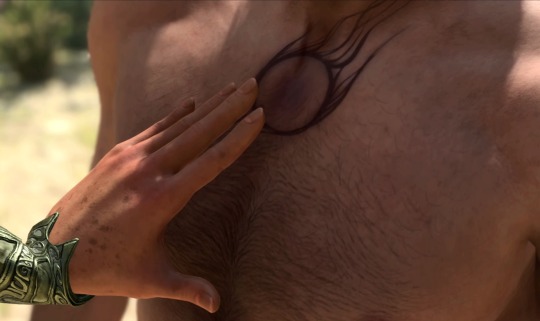
You asked for it! You're getting it! Yet another deep dive, this time about Gale's orb functioning as a chronic impairment/disability and the ways that a cure is dangled in front of him and even withheld from him.
Disclaimer: a lot of this has already been discussed by lore-wizards like galedekarios or mezzziah and some information is going to come from actual-lea's wild playthrough of the Gale Origin where they didn't give him any magic items just to see what would happen (which I recreated quickly in my own game to gather screenshots and gifs of my own). I'm not going to tag any of them because I don't want to bother them, but if you want even more lore, you can and should check them out!
We're going to look at Gale's orb "condition" in three phases: the effects of the orb on Gale's body itself, the ways that he has to treat it, and the potential cure for the orb. Because my deep dives always get a little out of hand, I’m splitting this into 3 posts. So you can take and leave whatever you like, but I'll link the masterlist to all 3 parts here once I have them posted!
But without further ado, let's deep dive!
I've said before that Baldur's Gate 3 is ultimately a game about cure—finding a cure for ceremorphosis, specifically. Every companion is facing a (potentially lethal) forced transformation into a squid creature in seven days or less unless they find a cure. At least, that's what they think before they realize that their tadpoles are special. On top of that, several characters, including Gale, especially Gale, are also dealing with additional chronic conditions that they wish to cure.
Let's set aside the search for the tadpole cure for a minute and focus on Gale—his character arc, his goals, even the text for his questline. The moment that Gale steps out of his pod on the nautiloid, he has a twofold goal: find a way to cure or treat the hungering orb in his chest and find a way to cure or stop ceremorphosis, in part because turning into a mind flayer may destabilize the orb, thus making the orb the bigger or more significant problem for Gale personally.
In other words, on two fronts, Gale's entire plot is concerned about curing a chronic, potentially lethal condition (or two), but the orb is the bigger issue between the two. Turning into a mind flayer is one thing, turning into a cataclysmic explosion that could "level a city the size of Waterdeep" is another.
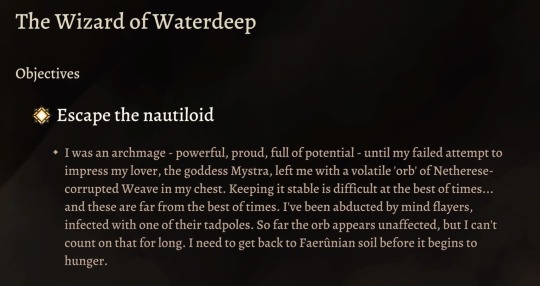
The Wizard of Waterdeep Objectives - Escape the nautiloid I was an archmage - powerful, proud, full of potential - until my failed attempt to impress my lover, the goddess Mystra, left me with a volatile 'orb' of Netherese-corrupted Weave in my chest. Keeping it stable is difficult at the best of times...and these are far from the best of times. I've been abducted by mind flayers, infected with one of their tadpoles. So far the orb appears unaffected, but I can't count on that for long. I need to get back to Faerûnian soil before it begins to hunger.
Despite being infected by illithid tadpoles, Gale's larger concern is that staying in the hells will make feeding the orb difficult. When he gets off the nautiloid, he's worried that turning into a mind flayer will completely destabilize the orb. It's his primary concern and will continue to be so throughout the game.

Narrator: Despite your recent fall from the nautiloid, you are miraculously unharmed. Apart from the volatile orb of Netherese magic buried within your chest, of course. It stirs softly. Soon it will hunger, and when that time comes it must be fed. Starve it, and you risk triggering a cataclysmic explosion of raw, unfettered Weave. Such an explosion will be unavoidable, if the tadpole in your skull triggers ceremorphosis. An outcome definitely best avoided.
So, yeah, the squid thing is a problem, but Gale is definitely more concerned about exploding. But exploding and "hungering" aren’t the only things the orb does to his body.
I’m going to break down the actual condition into three smaller segments: the words Gale uses to talk about his condition, the physical effects that Gale describes happening to him, and the mechanical gameplay effects. I’ll talk more about the actual “hunger” of the orb in part 2 when I talk about its treatment, in part because the hunger and the treatment are both magical effects and are intrinsically linked. But for now, let's start with a look at how Gale talks about the orb.
Call it a Condition
To start off, Gale describes having the orb in his chest along the same lines that people might discuss chronic impairments or chronic illness. It's not a minor "issue" or a "problem" that is disconnected from Gale's body and physical/mental health; instead, he calls it a "condition," a "malady," and even a "chronic impairment." He couches the condition in terms that evoke illness and unwellness.

Gale: You see, I have this...condition. Very different from the parasites we share, but just as deadly. Player: What kind of condition? Gale: The specifics are rather personal, but suffice it to say that it is a malady I have learned to live with - though not without some effort. Player: (Durge) You also feel disgust by how life, miserable as it is, insists of persisting in this most wretched world? / (Tav) Is it contagious? Gale: No, no - nothing like that. Though if I fail to treat it then the consequences would not be contained to me alone. Player: Can it be cured? Gale: No, it cannot be cured. And I assure you I've left no page unturned in reaching that conclusion. I can keep this condition under control, as indeed I've done for a significant amount of time, but that was under different circumstances altogether. Home, in Waterdeep. What it comes down to is this: every so often I need to get my hands on a powerful magical item and absorb the Weave inside.

Player (Ranger): I think I might have a dock leaf in my bag, or some medicinal berries... Gale: Thank you for the offer, but the treatment for my condition is very specific.

Gale: The reality of the matter is that a lone wizard with a chronic impairment such as my own is not in the most ideal of situations with regards to self-defence.
In Gale's first conversation with the player about the orb, which is where all of the above comes from, he uses language related to illness and chronic pain/impairment to discuss the orb. It's a "condition," it is a "malady" that requires "treatment," it is a "chronic impairment," and so on.
Generally, at first, he speaks lightly about it and even continues to joke about his condition ("my tower in Waterdeep has never been so free of clutter" and so on), but the reality is he's underplaying the actual physical toll it takes on his body. When you ask him what happens if he doesn't consume any artifacts, he'll briefly describe some symptoms to you that aren't obvious to the player character. Which brings us to...
The Physical Symptoms
This is how he describes the initial physical symptoms of the orb's hunger:
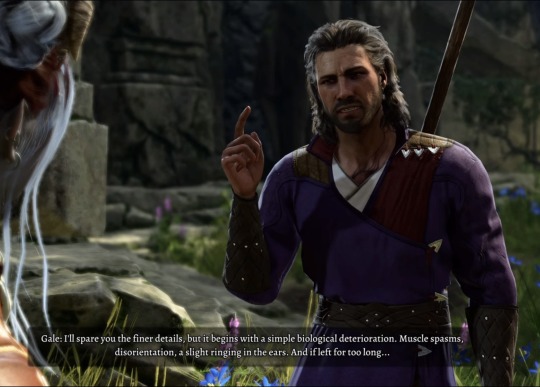
Gale: I'll spare you the finer details, but it begins with a simple biological deterioration. Muscle spasms, disorientation, a slight ringing in the ears. And if left for too long...catastrophe.
In other places, we see the orb's hunger/pain also affecting his ability to think clearly, suggesting he's experiencing a kind of brain fog or concentration issue, plus general discomfort, and a feeling like something is gnawing at his insides, as seen in various lines below.




Gale: You'll have to speak slowly. I'm finding it quite difficult to concentrate with my condition gnawing at my insides like a teething displacer kitten. Gale: Somehow the second artefact hasn't had the effect of the first. It's somewhat relieved the discomfort, but I fear my hunger hasn't quite... Ahh...* Gale: But... this doesn't feel quite right... It never feels right, but it relieves. This doesn't relieve... Ahh...* *devnote: Near the end of the line he's in discomfort, in pain
This is all from the second artifact conversation, when you give him the second item to try and feed the orb's hunger (the last line is a lower approval/you've-been-begrudging-about-items kind of line, so he's still being closed off with you). When you hear these lines in the game, he's obviously speaking with discomfort and with difficulty, as if trying to string words together despite the pain. His little comments as you travel with him/as him while he is dealing with arcane hunger also reference weakness, pain, and concentration issues.

- I'm feeling rather unsteady... - Deep breaths, Gale. Hold it together. - I'd be rather enjoying this journey, were I not wracked with pain. - One step in front of the other, Gale. - Ugh, I feel rotten. devnote: Slightly pained/struggling with a constant ache (the orb is negatively affecting him, causing him pain. Prompt is to remind the player that Gale is unwell.) [mumm's note: there are other lines as well, beyond these, and Gale will say them at random, so there's no progression into better or worse. This is just a sample of the lines.]
Given everything so far, I suspect the pain he feels is a combination of heart/chest pain, like one might feel during an anxiety attack, a POTS flare-up, or even a heart attack, while the gnawing sensation could be like hunger cramps (or any other internal cramping, though I think for Gale it feels higher up in his body than in his stomach, given the orb's location).
I highly suspect the orb is feeding off of not only his magic, but his body as well. We know it feeds off his magic specifically (more on this in the other two parts, especially because this detail doesn't come to light until Gale meets with Mystra). But given the pains and the way he frames his condition as a state of deterioration, it's likely that it's also feeding off energy stores and other biological/physical elements of his body, not unlike how extreme hunger can cause your body to essentially eat itself—your fat stores first, but eventually even your muscle tissues and other vital tissues.
(I've seen someone suggest this is why Gale has "dehydration state" chiseled abs like movie stars have because the orb is literally eating away at his fat/energy stores and so on. It's a compelling theory!)
The orb also weakens him, likely causes massive fatigue, and even seems to be draining his "spirit" or his mental capabilities. We see this in descriptions of Arcane Hunger (which are below). It's a wonder this man can put one foot in front of the other if the pain is particularly bad.
In addition to all the other physical symptoms, the orb itself has physically scarred his body with the marking on his chest, which is also bruising pretty significantly (though this "bruising" could just as likely be dark-colored magic just beneath his skin, your headcanon/mileage may vary).
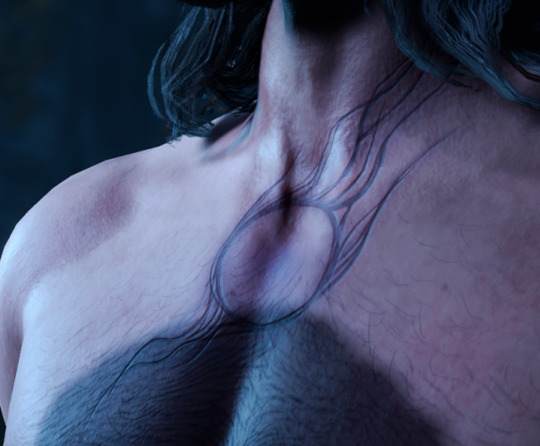
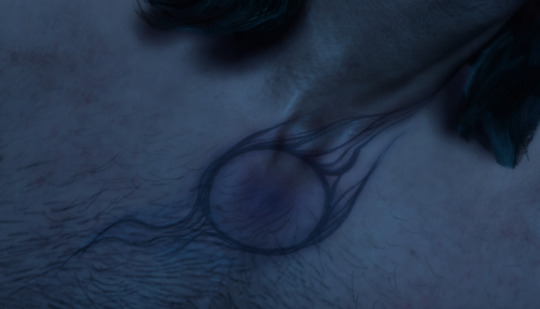
Photo credits: @elspethdekarios, though I cropped them down for this deep dive
If you click on the images and zoom in, you can see how the markings have a bit of depth and texture to them, as opposed to the flat lines of a tattoo. The lines are carved into his skin. Certain lighting will also make the mark look darker or lighter, and make the bruising at the center faint or noticeably dark. There are some theories that the bruising gets worse as the game goes on, but I think it's just a lightning issue (though it would be interesting if the bruising gets darker with each new level of arcane hunger, or something to that effect).
Lastly, and I'll discuss this more in part 2, even when the orb does not actively pain Gale, it "stirs." Other references from the narrator reveal that the orb "shudders" or "prickles" within him. Gale can feel the movement of the orb inside his body, possibly like a weird fluttering or vibration in his chest. It's likely why, even when he isn't actively hungering, he'll put his hand over his chest and adjust his shoulders, as if reacting to a strange and slightly uncomfortable sensation within his chest.
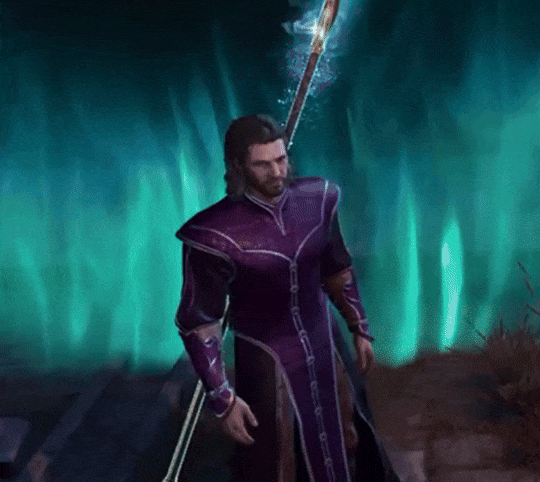
Anyway, long story short, the physical symptoms of dealing with the hungering orb are:
Biological deterioration (like hunger, the body consuming itself, muscles weakening, etc)
Muscle spasms
Disorientation
Ringing in the ears
Difficulty concentrating/brain fog/mental fatigue
Cramping and/or chest pain
General discomfort and pain
Physical fatigue/feelings of weakness
Scarring and bruising from the orb itself
A sensation of the orb "stirring" even when not painful
And this man will joke about it.
Honestly, his ability to joke and discuss his condition with humor is a sign to me that he really is experiencing and thinking of the orb the same way people with chronic conditions think about their pain or illnesses. At the start of the game, Gale's condition is incurable—Gale says as much himself that it "cannot be cured." It can only be managed, treating the symptoms and diminishing the pain, rather than completely eradicating the impairment. Gale likely has a new scale for pain, the same way people with chronic pain do. A "bad day" for him would likely end most healthy, normative people in a clinic hoping for some prescription pain medication, whereas he will just grit his teeth and keep going. In short, saying that the orb is a "chronic impairment" is a bit of an understatement, and I don't think people realize just how much Gale is/acts like a person dealing with real-world chronic pain or chronic illnesses.
Gale is used to this pain, though he certainly isn't enjoying it. Have you ever persuaded him to wait before giving him a magic item? If your persuasion is high enough (and he likes you), he'll give a cheery "of course!" even though treating the pain is obviously the preferable path here. When he reminds you of his need for an item, as with the "teething displacer kitten" line or the "My condition likes being ignored as much as I do," he still conveys these lines with a mix of urgency and dark humor. He's dealt with this condition for a year or more. You might be testing his tolerance by withholding items, but he's not going to let on just how badly he's actually feeling.
This is the man who will uncomfortably laugh and say "Gods, this is bloody uncomfortable," while the orb in his chest is running a high-grade POTS flare-up and consuming his innards. That's what we call an understatement, Gale. He could complain a lot more, and far more loudly, but he's actually keeping it quite restrained, as people with chronic pain often tend to do.
So anyway, if you ever hear anyone complaining that Gale complains about his magic orb condition too much, ask them how much they'd like walking around with heart-attack symptoms for a few hours at a time. But let's move on!
The Gameplay Effects
Now that we know what the orb does to Gale narratively, what does his condition do to him mechanically in the game? Because, unlike with Karlach's unstable engine or Shadowheart's incurable wound (other examples of chronic pain/disability in the game), the game adds actual debuffs to Gale's character that can affect gameplay and battles. Therefore, leaving Gale disabled with pain also, in effect, disables the player's ability to play the game (or at least hampers it).
In the game, there are three stages of Arcane Hunger. Most people generally don't go beyond the first stage, because why would you let Gale walk around with a debuff of any kind if you have a locket of dancing lights you'll never use? But if you continue to ignore him (or, if you're playing as Gale, and willfully choose not to consume any items) then the Arcane Hunger will progress to Greater and Severe Arcane Hunger, bringing even more serious debuffs to his character.
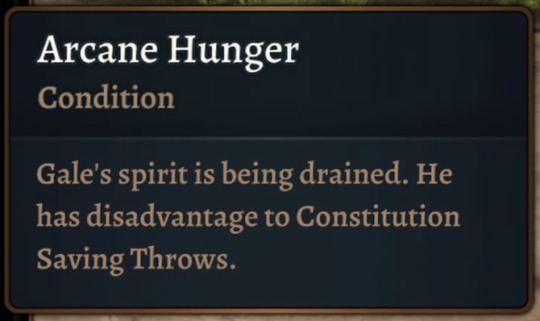
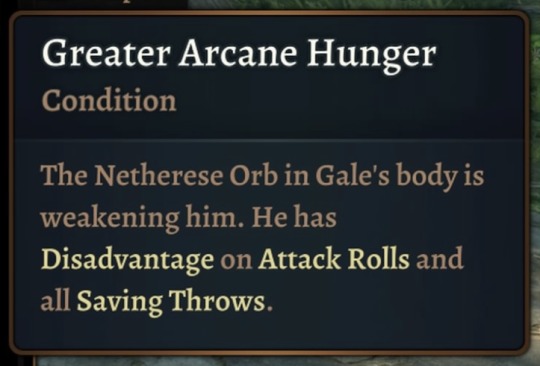
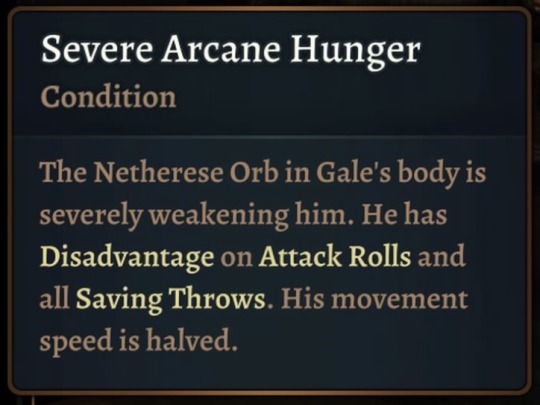
Arcane Hunger - Condition Gale's spirit is being drained. He has disadvantage on Constitution Saving Throws. Greater Arcane Hunger - Condition The Netherese Orb in Gale's body is weakening him. He has Disadvantage on Attack Rolls and all Saving Throws. Severe Arcane Hunger - Condition The Netherese Orb in Gale's body is severely weakening him. He has Disadvantage on Attack Rolls and all Saving Throws. His movement speed is halved.
Casual reminder that Constitution Saving Throws generally affect concentration, which is needed to maintain spells that last for more than one turn. This goes back to Gale's concentration/mental fatigue when he's initially hungering. When the hunger progresses, however, Gale is physically weakened and the game makes it so that he's more likely to fail savings throws or attacks.
Trying to normally play as Gale with these debuffs is basically an exercise in resigning yourself to missing attacks frequently and failing literally every saving throw (this includes disadvantage on saving throws in dialogues as well). He's still playable, since Magic Missile never misses and you can work with spells that deal damage even when an enemy passes their saving throw, but he becomes even more of a glass cannon than ever. If he's not at the back of a fight, he goes down pretty quick.
Once you hit Severe Arcane Hunger (which I hit after only 6.5 hours of rushed gameplay, though you could probably hit it sooner if you were zooming through a bit faster than me) you're also forced to walk everywhere. Gale's movement speed is halved. The distance he can move in a single turn is drastically shorter than usual, and his speed is no faster than a casual walk. Anyone who has tried to move while encumbered knows this same walking speed debuff.
So the game literally takes Gale's chronic impairment and makes it disabling to both him AND you controlling him. No one really wants to play the entirety of BG3 at a walking pace, after all, so it forces you to make a decision—will you finally treat Gale's condition, or will you grit your teeth and bare it, like Gale does with his pain (though it's nowhere near close to the same levels of discomfort).
Typically a companion Gale will just leave if you refuse to give him any items and he progresses to the stage where he's at Severe Arcane Hunger. But if you play as Origin Gale, you can keep playing with Severe Arcane Hunger until, well, his condition literally paralyzes him and then he withers away, apparently dying of necrotic damage from the orb (I’m assuming here, because the log doesn’t specify what damage causes Gale to wither away, and he exudes a necrotic damage aura once he’s dead, which happens whenever he dies anyway).
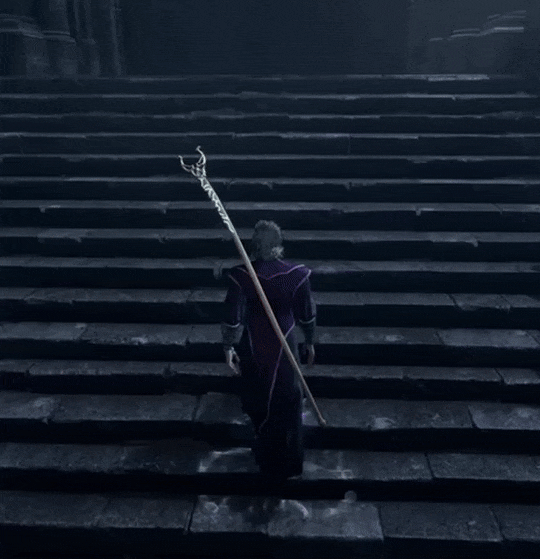


Gale withered away. Gale lost Condition: Gale is Paralysed. Gale received Condition: Gale is Paralysed. [mumm's note: obviously this is listed in reverse order, because Gale becomes paralyzed and then withers away]
It appears that if left untreated, Gale’s biological deterioration reaches a point that it literally shuts his body down completely, and then he just...dies. I imagine that physically the orb has eaten away at so many of his vital tissues, including his internal organs, that everything just sort of ceases to function. He's corrupted from the inside out, and nothing but death and a quick resurrection can reverse those effects.
It's worth noting that if you choose to do this experiment with Origin Gale and don't feed him a single magic item, then Elminster won't be waiting for you to arrive in the Mountain Pass or just outside the Shadow Cursed Lands if you travel through the Underdark. Since Gale hasn't been managing his symptoms, he hasn't realized that the various items he's consuming aren't having any effect. Therefore, he isn't actively looking for a new solution to treat the symptoms. Since he isn't looking, I guess Elminster never thought to make himself available with the new solution?
Honestly, why Elminster doesn't show up is kind of a mystery. Gameplay-wise, I assume it's that Gale's quest didn't progress enough to trigger the game flag that would spawn Elminster. But lore-wise or narratively, it doesn't make sense. Mystra sends Elminster with both a command and a temporary "cure," so is she just waiting until Gale realizes his symptoms can no longer be managed? No idea. Maybe I'll explore it more in Part 3.
Anyway the point is that when an untreated Gale reaches Moonrise without talking to Elminster, the game (and his condition) shuts him down. When you revive him at camp, Elminster conveniently appears to give him Mystra's command to sacrifice himself at the Heart of the Absolute and stabilizes the orb at last.
But there's a catch.


Elminster Aumar: A shame that we did not cross paths sooner. The orb's thirst for magic is now quenched, yet it already inflicted some damage while you tried to forge ahead. The ill effects may linger, I'm afraid. Not enough to hamper your mission, I hope.
I believe this can also happen with a companion Gale, but I'm not sure about the specific parameters of triggering this. Regardless, as actual-lea has observed in their No Gale Dinner experiment, if Gale has regular Arcane Hunger then Elminster stabilizes the orb and all is well, but if he has Greater or Severe Arcane Hunger, then the damage the orb does to his body becomes irreversible. After Elminster stabilizes the orb, in this scenario, Gale is left with a permanent "Arcane Hunger" debuff, the same as the above, where he suffers disadvantage on constitution saving throws. This time, you can't consume items to make it go away, and nothing will cure the debuff. Gale just permanently has it for the rest of the game.
(It's worth noting that you can also kill Elminster while he's talking with Gale, thus preventing him from stabilizing the orb with his magic and from telling Gale he needs to sacrifice himself. This sort of breaks the narrative for Gale and results in some wonky dialogue chains that do and don't flag correctly, but the interesting outcome is that it means you can continue playing the game with Severe Arcane Hunger, which is now also a permanent debuff. You can consume magical items before the Elminster visit, but never after. Even if you kill him, you lose the ability to consume items, which means it is officially impossible to manage Gale's symptoms. You just have to deal with the halved walking speed and disadvantage on everything. And you can complete the game that way, if you have the patience! But it would be a very long game. I would know. I've done it and I was rushing like a maniac lol)
Anyway this is getting super long, so I'll end with a few wrap-up thoughts.
Final Thoughts
Having played as Gale with Severe Arcane Hunger for several hours in the game, I think Gale honestly downplays just how bad the pain and debilitating effects of his condition really are. As I was going through the evidence, I kept thinking about how there are so many different elements of pain, discomfort, fatigue, and general unpleasantness that are all part of Gale's everyday life. Even when the orb is stabilized or not actively hurting him, he likely still feels it moving in his chest and I imagine there are chronic effects that stabilizing the orb couldn't exactly cure, like lingering fatigue (and we wonder why Gale complains about his knees and wanting to take a rest and so forth).
Ookay the knees thing might be unrelated to the orb but I digress
Dealing with that much pain and internal corruption is a state of living that most people wouldn't want to stay in, and Gale is no exception here. He wants to stop the pain in his chest, just as much as he wants his former abilities and magical prowess to return. These things are connected, which I'll talk about in part 2. But without hope of a cure, Gale is forced to deal with his condition as a process of managing symptoms, creating a treatment plan that involves him consuming magic from magical items just to get a bit of relief.
But that, my friends, is where we'll pick up with Part 2 - The Hunger and the Treatment.
#screw it we post#hooooo boy this got LONG#I'm sorry and you're welcome in advance#bg3#baldur's gate 3#bg3 lore#bg3 meta#bg3 deep dive#deep dive#long post#gale#gale dekarios#gale of waterdeep#bg3 discourse#bg3 screenshots
389 notes
·
View notes
Text
You love Ginger Fitzgerald because you think she's a girlboss.
I love Ginger Fitzgerald because she's a pathetic and compellingly mean-spirited social outcast who wants to fuck her sister – because she’s a metaphorical rape victim (taking into account the lycanthrope attack was deliberately filmed to reflect a rape) who becomes the monster that destroyed her, enacting similar violence upon a loved one, emulating the patriarchy while nominally lashing out at it – because her actions are a result of her trauma, the result of her circumstances: the incest born of the isolation that comes from bullying and the inward-coiling of a life among dead-end streets, a life already unlived because the suburbs suffocate, fostering an unhealthy closeness because eyes that look are not eyes that see, and the perpetuation of untroubled suburban normalcy means she can blur boundaries in plain sight – but, even then, she is not one-dimensionally evil because she’s a teenager struggling with a life that she cannot escape, that the attack proves to her is inescapable – is she a deeply repressed lesbian? that might be my read, but she doesn’t have the tools to find herself in a healthy way, and she doesn’t live long enough to be able to come into her own, her “coming-into-her-own” is just the death-spiral of a body she never asked to be in, mutilated by circumstances she never asked to suffer, the mutilations staying and shifting even as the wounds heal over rapidly in the bright light of denial – her transformation lending itself to so many different trans readings, transmasc Ginger, transfem Ginger, nonbinary Ginger, in any case, puberty is hell, confines of cul-de-sacs, dead ends made flesh, the sisters' death project an effort to make those dead ends into flesh, turn their flesh into art and art into defiance… but your own body screws you, screws you, screws you, circling back to violation, violation done unto her and done by her to others – and yet the film has compassion for her until she breathes her last breath, even as she breathes her last breath and bleeds and Brigitte has had her cinematic arc of declaring, “I’m not dying in this room with you!”; even after that, Brigitte still stays with her, still loves her, and there was love in Ginger in spite of everything that went wrong, and those words “everything that went wrong” are not meant to elide the abuse and that word “love” is not meant to absolve it, but the love is still there – even as it hardens into use, everything corrupted by control, taught by time that you are trapped and the only triumph is trapping others – she’s still a girl who may not be a girl begging violently not to be alone – and she’s not alone in the end, even as Brigitte has come into her own in a way Ginger could not (or tried to come into her own, the coming year bringing ghosts for Brigitte that are Ginger’s making and Brigitte’s own mind’s) even as B has fulfilled her cinematic arc of becoming her own without Ginger, she still holds Ginger close in death, B still loves her even as she realizes she cannot survive with her, the film’s music still mourns her, the film still mourns her – because, whatever she was, she did not deserve to be eaten alive from the inside out, strangled in her own skin – and I love her because I pity her as I pity Brigitte, both of them victims, I pity her because Ginger is as much a victim as she is a victimizer, and I am not using her victimhood to disregard the fact she is a victimizer – but I love her because I connect with her body betraying her, with the denial as things get worse and worse until all that is left is explosion (I connect with Brigitte too, more deeply, in fact – Brigitte at war with her own body the way I am at war with my own body – but I cannot pretend I don’t connect with Ginger and her denial, her collapse in denial that these changes were wrong, because I lived that several years of my life – and I cannot pretend I don’t connect with Ginger just because I have a more ‘palatable’ option in Brigitte), I love her because she’s a child who never got the chance to grow up.
We are not the same.
188 notes
·
View notes
Text
I think people forget with Cullen, and characters like Cullen, that indoctrination is a thing. We're lucky to live in an age where we have a surplus of access to resources that allow us to think critically on the structures around us, to the point where we overlook that most people won't and haven't. Cullen was raised in a backwater village where the main educators and leaders were Templars. He was likely taught scripture by Chantry Sisters, he possibly learned to read and write through them. From the day he was born, he was being taught to love and obey the Chantry with out question--and the Chantry teaches that Templars are a force of good.
So I ask you, how the hell was Cullen, at eight or thirteen years old, going to learn about the crimes of Templars? How was he going to unlearn propaganda that was fed him to him every day by people he respected and possibly loved? How was he supposed to be aware that this idolized image of Templars being the saviors of the people and even mages was a lie?
And then he gets shipped off, happily, to be trained a Templar. Again, he's put into this position where he's fed nothing but propaganda. He doesn't get a real taste of the Order being corrupted until he's out in Kinloch and he's not sure what the hell to do because what he's seeing isn't jiving with what he's been taught for nearly two decades. So yeah, he tries to justify it, he tries to have his cake and eat it too by reasoning that mages should be treated like people but also the Order wouldn't lie to him, so they must be right to act like this. The Maker always had a plan, right?
If Cullen had been lucky, maybe he could have realized earlier on that the Order was abusing mages, that he had been tricked, he could have gotten out and unlearned the bigotry that was planted inside him.
But then BAM! the Broken Circle happened and I don't see how no one gets how perfect this is for the Order? They now have a templar that is so traumatized by mages, he will literally do and say anything to justify their abuses because now? Now he's afraid.
And remember, after Origins, Cullen becomes so erratic, he has to be sent off to a Chantry to 'even him out'--where he was more than likely manipulated even further by the Chantry to be this blood thirsty agent for them. When he's shipped to Kirkwall, they could have not delivered to Meredith a better second in command.
So yeah, is it really surprising that he says shit like 'mages aren't people like you and me' when we meet him in Kirkwall? Man is sleep depraved by the looks of him, swallowing all Meredith's frenzied rhetoric on blood mages, he's seeing for himself the damage these mages are doing, he's isolated from his family, he has no actual friends, and he's living with C-PTSD among other issues. Even under the best of conditions, none of what he says or does in DA2 is surprising when you put it all together.
And yet, the man still had enough of that idealistic child left in him to realize see that Meredith was going off the deep end and that he should be protecting the mages. That's text. That's in World of Thedas. The reason why Cullen is able to turn on Meredith in the end is because he was able to see, even clouded by his fear and hatred, that what she was doing was wrong.
And all this isn't to excuse Cullen's wrongs. It's weird how every time someone brings up Cullen's history, it's assumed that it's just a justification for his actions. It's not, it's an an explanation. Cullen was a victim of the Order that became an abuser, a tool, and he is responsible for his actions.
But the thing is, by DAI, Cullen is well aware of his sins and he actively works to better himself by leaving the Order and getting off lyrium (which for most people is a death sentence). People can argue all day about whether or not Cullen's arc in DAI redeems him or was satisfying, or if he did enough to 'prove' that he was sorry or--good god--does he deserve redemption in the first place (which is such a Catholic way of looking at shit by the way; no one 'deserves' redemption; you do it to be better or you fucking don't) but the fact is that Cullen says that he wants to be better, that he sees the Order as--at the very least--flawed.
That, yes, he's still unlearning all the bigotry he held as a younger man and he's ashamed that he was like that to begin with.
You can hate him all you like, and whatever, but Cullen's story--intentionally or not--is about a man born into an oppressive society, raised to uphold its beliefs, used and abused by it, and then awakening to those lies and trying to free himself from those beliefs so he could be a better person.
And sometimes I genuinely wonder if the reason so many people hate Cullen is because they themselves might have dealt with something similar in our own oppressive society where they also had to unlearn harmful bigotry and maybe, just maybe, he hits too close to home.
#cullen rutherford#writing#this about this guy again and how he gets such an unfair shake when I know for a fact a good portion of us are no better#you can say you are that you would know as a CHILD that this was wrong but hahaha I guess some of us aren't able to see through propaganda#man is nuanced as hell and the statements 'Cullen was a victim who was brainwashed by the Chantry' and 'Cullen is a grown man who actively#hurt mages for his own selfish reasons' can co exist quite easily#you know like how Blackwall also killed an entire family for money and yet has spent years trying to atone for that mistakes#anyway I'm right get out of my house
361 notes
·
View notes
Text
Bells Hells taking this on themselves, while it looks selfish/crazy/stupid, makes so much sense. They have been shown time and time again that higher ups will not listen to them or have ulterior motives. They've seen evidence of corruption from the first arc of the campaign. They ran from Vasselheim soldiers before being welcomed by that same city. They watched the gods destroy a city out of selfish fear. The only authority figure (that hasn't been killed) that has supported them without an agenda is Keyleth who vouched for them to do this duty. This motley band of fuck-ups is so disillusioned that they realize no one in Exandria is the "right" person to make the decision. They don't think they're a better choice, they just realize there is no 'better choice'. They're here, so they're the ones that it falls upon. They've always been the people unfortunate enough to be around when shit went down, so why is this any different? Someone's gotta do it
#part one of a billion thoughts i have about this campaign#yapping into the void#cr3#critrole#critical role#cr spoilers#critrole spoilers#cr3 spoilers#rambles
106 notes
·
View notes
Text
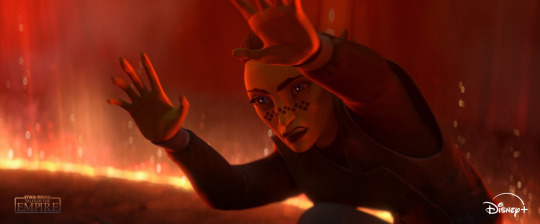
Okay, two weeks to go, putting my cards on the table: there is no way in hell that Barriss is going to be an Inquisitor. That's not what this is. Everyone’s taking for granted that because the trailer sets up her training as an Inquisitor that means that we’re seeing a corruption arc for her, but just. Look at her. There is not a single frame of this trailer where she is not visibly looking for the exit. There is not a single frame of this trailer where she isn’t either visibly masking what she’s feeling or just looking determined to survive. This isn’t a start of darkness; it’s Ahsoka getting hunted for sport in Padawan Lost.
We aren’t doing the “we’re setting Barriss up as an Inquisitor so we can give her a redemption arc later” scenario. This is the redemption arc, this is her facing an in-universe attempt to force her into the fanon Inquisitor!Barriss mold that she doesn’t fit into at all, and she’s going to prove it and she’s going to outsmart all of these actual fallen Jedi she’s surrounded by who are trying to make her be like them. When Order 66 happened, Barriss was sitting defenseless in a cell and was offered a series of choices that weren’t real choices. But she knows that, she is not buying into it, and that offers her one, incredibly dangerous route to freedom: convincing them to trust her enough to send her into the field with a lightsaber.
It’s going to be rough, it’s going to be an incredibly dangerous, difficult path for her to navigate—they will make her do some messed up stuff to prove herself and for a moment it might look like she's given into despair—but she’s going to come out the other end of this miniseries having rejected both the Empire and the dark side. Not only as a Jedi in every way that matters but also as someone who is equipped with knowledge of how the Inquisitorius operates, which she can use to save as many people as she can from them—because she knows what happens when they take you alive.
And she's going to do it all onscreen in a story that is about her, she is the main protagonist here, and that is frankly something that was beyond my wildest dreams.
This isn’t wishful thinking on my part, this isn’t me trying to do a preemptive rewrite—this is me looking at what’s onscreen in this trailer, at what they’re telling us, at what they’re not telling us, and seeing the story laid out in front of us.
The only way out is through.
#star wars#barriss offee#tales of the empire#I can break down citations but if I did this post would be a mile long and take me all week so tldr just pay attention to her in the traile#and to the narrative framing around it#'divergent paths' wrt her and morgan in the official series description. etc.#so like. it feels unreal but after 11 years this is how we win#because if they were gonna just lazily make her an inquisitor they would have put it in the background of something else years ago#instead of waiting for a chance to animate a whole story for and about her
257 notes
·
View notes
Text
One Hell of an Unpopular Opinion #02
Note: This opinion is longer than the first one as I'm super passionate about this one compared to last time. Because of that it might come across as a bit of a rant. Side Note Regarding My Previous Post: I came up with a proper acronym for C.H.E.R.U.B. as I plan on using them in my rewrite for HB and what I came up with was the Capable. Habitual. Earnest. Reliable. Upbeat. Bureau. This took me all of two to three minutes to come up with. _______ Adina should've/should be in Hazbin Hotel's series due to how much she fits with the whole, "Heaven is corrupt," idea that the show is going for.

For context, Adina was a character from Viv's Zoophobia days who was featured in the scrapped Angels vs. Demons arc alongside Emily. That's right, much like most of the Hazbin Hotel cast, Adina and Emily were in the same Zoophobia arc too! However, unlike Emily, Adina's character was ultimately scrapped and replaced by Sera (by the way, you're not being clever with that name Viv) who is nowhere near as much of a threat as Adina was.



These three images ALONE already express so much about Adina as a character to the point where you can tell JUST BY LOOKING at them that if anyone were to try and convince this woman that her beliefs are wrong, they would probably either be murdered or tortured immediately. By the way, if that silk ribbon bow that Adina wears wraps around anyone that isn't herself, it not only reveals but forces demons (as seen by beta design Angel Dust) to RE-LIVE their MOST UNPLEASANT AND TRAUMATIC EXPERIENCES. And on top of all of this...

HER TRUE FORM WOULD'VE BEEN THIS GIANT ELDRITCH LOOKING DRAGON CREATURE! VIV, ARE YOU TELLING ME THAT YOU TRADED AN ACTUALLY GOOD VILLAIN WITH A GENUINELY BAD ASS FINAL FORM THAT FOLLOWED THE SHOW DON'T TELL RULE FOR ONCE ALL FOR A STATIC CHARACTER WHO'S FINAL FORM IS BASICALLY JUST A FUCKING BIRD!?!? ... Obviously, the answer to that question is yes. That being said, it will never cease to piss me off how or why the answer to that question is yes. Moving on, I heavily believe that Adina's character could still work incredibly well within Hazbin Hotel and to where you could still keep Sera if you wanted to. Simply, have her be Sera and Emily's mother. That's what I'm doing for my rewrite of Hazbin Hotel. To me it makes sense especially how Adina being Sera's mother would explain why she's so hesitant in stopping Hell's yearly exterminations. Although, that isn't exactly what I plan on doing for my rewrite you, reader, could use it for yours (if you plan/want to rewrite the show that is.) In conclusion, I'll never forgive Viv for replacing Adina with Sera because even if I wasn't a writer that was just a terrible decision to make. Like, you literally had all the material and potential there and you chose to scrap it. But hey, that's Viv for ya. Always scrapping good ideas.
#hazbin hotel critical#vivziepop criticism#vivziepop critique#wasted potential#hellaverse critical#hellaverse#anti vivziepop#A little bit of a hellaverse rant
130 notes
·
View notes